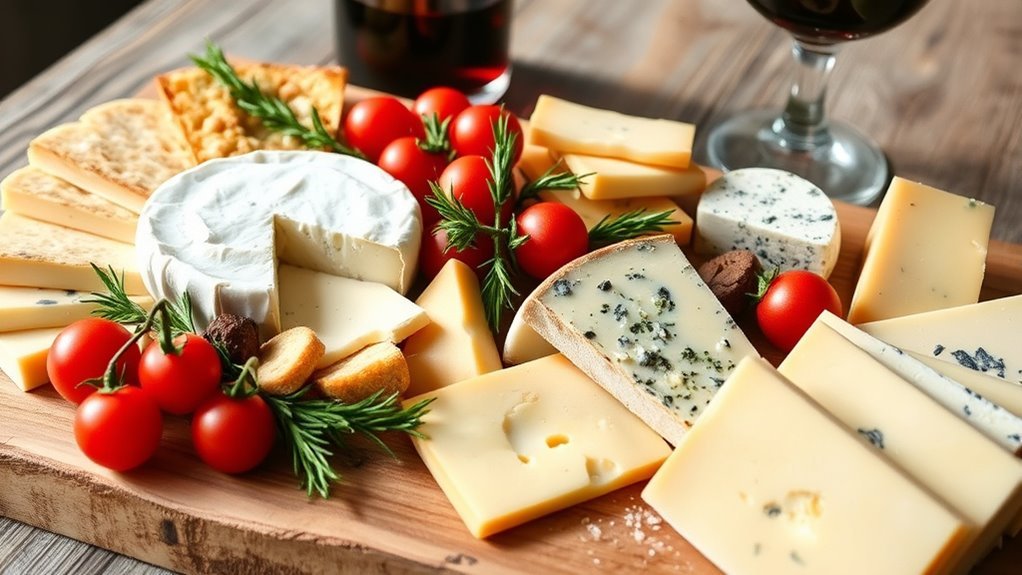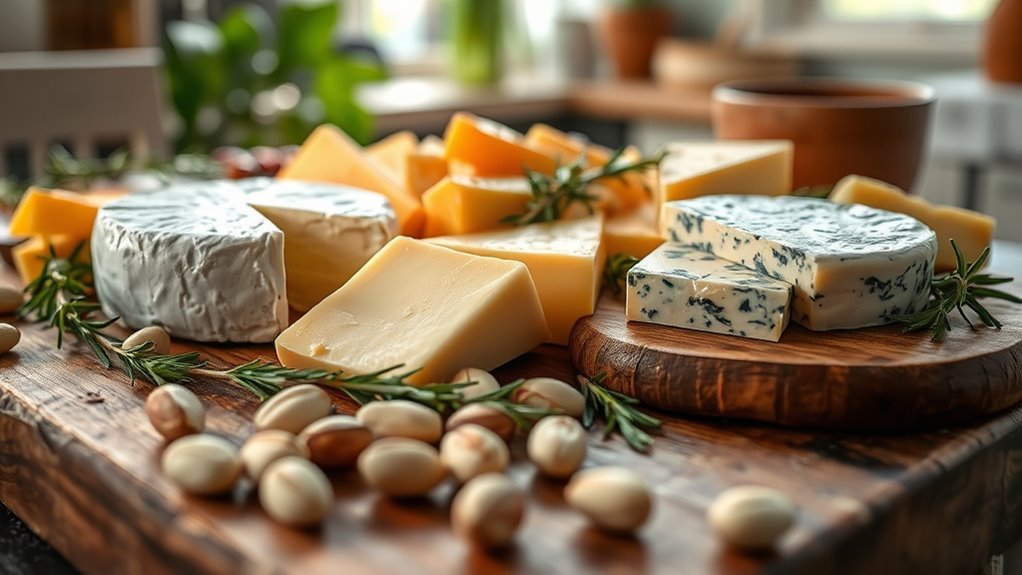Yes, cheese is keto-friendly! It’s high in fat, moderate in protein, and low in carbohydrates, making it an excellent choice for your ketogenic diet. Varieties like cheddar and parmesan are especially low in carbs, with around 1g per ounce. Cheese is nutrient-dense, providing essential vitamins and minerals while keeping you satiated. Just be mindful of portion sizes and check labels, as some softer cheeses may have higher carbs. You’ll discover more about incorporating cheese into your keto meal plan.
Understanding the Ketogenic Diet

When you’re exploring dietary options, understanding the ketogenic diet is vital for making informed choices. The keto basics revolve around a high-fat, moderate-protein, and very low-carbohydrate intake, which shifts your body into a state of ketosis. This metabolic state encourages your body to burn fat for energy instead of carbohydrates. However, diet misconceptions can lead to confusion; many believe keto is just about eating bacon and cheese. In reality, it’s important to incorporate a variety of healthy fats, proteins, and low-carb vegetables to guarantee nutritional balance. As you navigate this journey, remember that the keto diet isn’t a one-size-fits-all approach; it’s about finding what works best for your unique lifestyle and health goals.
Nutritional Profile of Cheese

When considering cheese in your keto diet, it’s essential to look at its macronutrient breakdown. Cheese is typically high in fat and protein while low in carbohydrates, making it a great fit for keto. Additionally, it provides various vitamins and minerals, contributing to a well-rounded nutritional profile.
Macronutrient Breakdown
Although cheese is often celebrated for its rich flavor and versatility, its macronutrient profile is essential for those following a ketogenic diet. Different cheese types vary in their macronutrient ratios, typically featuring higher fat content and lower carbohydrates. For instance, cream cheese and cheddar are primarily high in fat, making them ideal for keto. A standard serving of cheddar may contain about 9 grams of fat, 7 grams of protein, and less than 1 gram of carbs. This balance not only helps maintain ketosis but also adds flavor and satisfaction to your meals. By choosing cheese wisely and considering its macronutrient breakdown, you can enjoy this delicious food while staying true to your keto goals.
Vitamins and Minerals
Cheese isn’t just a source of fats and proteins; it also packs a variety of vitamins and minerals that contribute to a balanced diet. Here’s what you can find in cheese:
- Calcium: Essential for bone health and plays an important role in calcium absorption.
- Vitamin K2: Important for bone metabolism and helps direct calcium to the bones, preventing it from depositing in arteries.
- Vitamin A: Supports vision, skin health, and immune function.
- B Vitamins: Promote energy production and help maintain healthy brain function.
Incorporating cheese into your meals not only enhances flavor but also boosts your nutrient intake. Just remember to balance it with other foods for peak health benefits while enjoying your keto journey!
Carbohydrate Content in Different Cheeses

While you might think all cheeses are created equal, their carbohydrate content can vary greatly. When you’re on a keto diet, understanding this carbohydrate comparison is vital. For instance, hard cheeses like Parmesan and cheddar typically have lower carbs, often around 1 gram per ounce. In contrast, softer cheese varieties, such as ricotta or cottage cheese, can contain 5 to 6 grams per ounce. Even fresh cheeses like mozzarella can surprise you with their higher carb counts. So, if you’re looking to maintain ketosis, it’s essential to choose your cheese wisely. Always check labels and be mindful of portion sizes to keep your carbohydrate intake in check while enjoying your favorite cheese varieties.
Health Benefits of Cheese on a Keto Diet
Cheese is a nutrient-dense food that can provide essential vitamins and minerals while fitting into your keto diet. It supports your intake of healthy fats, which are vital for maintaining energy levels and promoting satiety. Incorporating cheese into your meals can enhance both flavor and nutritional value, making it a valuable addition to your keto lifestyle.
Nutrient Density of Cheese
Incorporating cheese into a keto diet can provide an array of health benefits, thanks to its impressive nutrient density. Various cheese varieties are packed with essential vitamins and minerals that can enhance your overall well-being. Here are some key benefits:
- Calcium: Supports bone health and aids in nutrient absorption.
- Protein: Provides a satiating source of energy, helping you stay full longer.
- Vitamins: Rich in B vitamins, which are vital for metabolic processes.
- Healthy Fats: Offers beneficial fats that can support brain function.
Supports Healthy Fats
Including cheese in your keto diet not only enhances flavor but also provides a significant source of healthy fats. Various cheese varieties offer unique benefits, making it easier for you to meet your fat intake goals while enjoying delicious meals.
Here’s a quick comparison of some popular cheeses:
| Cheese Type | Healthy Fat Content (per 1 oz) | Additional Benefits |
|---|---|---|
| Cheddar | 9g | Rich in calcium and protein |
| Brie | 8g | High in vitamins A and B12 |
| Gouda | 7g | Contains probiotics for gut health |
| Feta | 6g | Low in calories, flavorful |
Incorporating these cheese varieties can help you maintain a balanced keto lifestyle while savoring every bite. Enjoy the freedom to indulge!
Tips for Incorporating Cheese Into Your Keto Meal Plan
While you might think that following a keto diet means giving up many of your favorite flavors, cheese can actually play a significant role in enhancing your meals. Here are some tips for incorporating cheese into your keto meal plan:
- Use cheese pairings: Combine cheeses with low-carb veggies or nuts for added flavor and nutrition.
- Experiment with textures: Try creamy cheeses in sauces or crumbled varieties as toppings for salads or soups.
- Meal prepping: Incorporate cheese into your weekly meal prep for quick, satisfying options, like cheese-stuffed chicken or salads.
- Join cheese tastings: Explore different cheese varieties to find new favorites that fit your keto lifestyle.
With these tips, you’ll enjoy the rich flavors of cheese while sticking to your keto goals!
Types of Cheese to Choose and Avoid on Keto
Which types of cheese are best for your keto diet? When selecting cheese varieties, go for high-fat options like cheddar, mozzarella, brie, and goat cheese. These cheeses are low in carbs and can fit well into your keto lifestyle. They pair beautifully with nuts, olives, or low-carb veggies for satisfying snacks.
On the flip side, avoid processed cheeses and those with added sugars, like American cheese and certain flavored cheeses. These can contain hidden carbs that disrupt ketosis. Remember, moderation is key. Enjoy your cheese pairings, but keep an eye on portion sizes to maintain your keto goals. With the right choices, cheese can be a delicious part of your keto journey without sacrificing flavor or freedom!
1. Is cheese keto-friendly?
Yes, cheese is generally considered keto-friendly. Most types of cheese are low in carbohydrates and high in fats, which aligns well with the macronutrient requirements of a ketogenic diet. However, it’s essential to choose full-fat varieties and consume them in moderation, as some cheeses can have varying carb counts.
2. What types of cheese are best for a keto diet?
Cheeses that are particularly good for a keto diet include cheddar, mozzarella, cream cheese, goat cheese, blue cheese, and parmesan. These cheeses typically have low carbohydrate content while being rich in fats and protein, making them excellent choices for maintaining ketosis.
3. Can I eat cheese on a keto diet if I’m lactose intolerant?
If you are lactose intolerant, you can still enjoy certain types of cheese on a keto diet. Hard cheeses like aged cheddar and parmesan have lower lactose levels compared to soft cheeses. Additionally, lactose-free cheese options are available, making it easier for those with lactose intolerance to enjoy cheese while staying keto-friendly.
4. How much cheese can I eat on a keto diet?
The amount of cheese you can eat on a keto diet varies based on your individual macronutrient goals. A common recommendation is to limit cheese intake to about 1-2 ounces per serving. It’s essential to monitor your total carbohydrate intake to ensure you stay within your daily limits while enjoying cheese as part of your meals or snacks.
5. Are there any downsides to eating cheese on a keto diet?
While cheese can be a delicious and nutritious part of a keto diet, there are some potential downsides. Overeating cheese can lead to increased calorie intake, which might hinder weight loss goals. Additionally, some individuals may experience digestive issues if they consume too much dairy. It’s important to listen to your body and enjoy cheese in moderation.
References
- https://www.healthline.com/nutrition/cheese-keto-friendly
- https://www.ncbi.nlm.nih.gov/pmc/articles/PMC6470953/
- https://www.webmd.com/diet/obesity/what-is-the-ketogenic-diet
- https://www.dietdoctor.com/low-carb/food-list/cheese
- https://www.cdc.gov/healthyweight/healthy_eating/index.html
- https://www.jamanetwork.com/journals/jama/fullarticle/2675750
- https://www.verywellfit.com/what-is-a-ketogenic-diet-5197439


